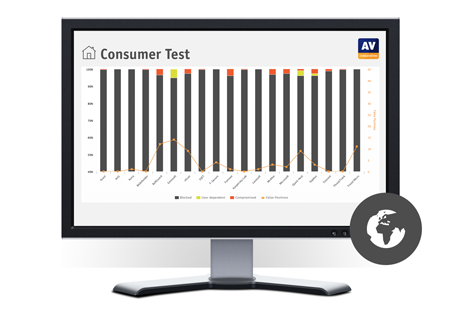AV-Comparatives releases results of 2020 Android Security Test
AV-Comparatives releases results of 2020 Android Security Test
AV-Comparatives tested 9 popular security apps about malware protection, battery drain and anti-theft functionality.
Independent security testing lab AV-Comparatives has published the report of its 2020 investigation into antivirus apps for the Android mobile platform. The Innsbruck-based institute tested 9 popular security apps with regard to malware protection, battery drain and anti-theft functionality. Third-party products made by Avast, AVG, Avira, Bitdefender, G DATA, Kaspersky, Securion and Trend Micro were all scrutinised, along with Google’s built-in security measures in the Android platform.
The latest version of Google’s mobile OS, Android 10, was used for the test. Users who are planning on buying a new smartphone, or updating their existing phones to the newest OS version, can see how well the tested products perform on the latest incarnation of Android.
In the malware protection test, over 3,000 recent malicious applications for the Android operating system were used. The results clearly showed the advantage of using a third-party antivirus product to protect smartphones against Android malware.
To ensure that the tested products do not achieve protection at the expense of high rates of false alarms, a false-positives test was also run, using 500 popular legitimate apps.
Anti-theft functionality was also considered. This allows a user whose smartphone has been lost or stolen to e.g. locate it, lock it, and wipe private data. Anti-theft features in the tested products were tested for reliable operation.
A past criticism of security programs is that they cause significant drain on the device’s battery. AV-Comparatives addressed this issue by running a battery-drain test. The effect each product has on battery life during everyday phone usage (making calls, surfing the Internet, watching videos and sending emails) was measured.
As well as the results of the tests, the report includes general security advice and information for users of Android devices. The new security measures incorporated into Android 10 are considered, along with the effect these have on third-party security apps. Security tips for Android users are also provided.
Like all AV-Comparatives’ public reports, the report of the 2020 Android Mobile Security Test can be downloaded free of charge from the institute’s website, www.av-comparatives.org.
AV-Comparatives offers AVC UnDroid, a well done malware analysis tool, which is available free to all users. It is a static analysis system for detecting suspected Android malware and adware and providing statistics about it. Users can upload APK files and see the results in various analysis mechanisms.
Try it out:
AV-Comparatives testete 9 weit verbreitete Android-Security Apps
Die Ergebnisse zeigen, dass Sicherheits-Apps von Drittanbietern auf hohem Niveau schützen.
Das unabhängige Sicherheitstestlabor AV-Comparatives hat seien Android-Security Report für 2020 veröffentlicht. Das in Innsbruck ansässige Institut testete 9 weitverbreitete Sicherheits-Apps hinsichtlich Malware-Schutz, Batterieverbrauch und Diebstahlsicherung. Produkte von Drittanbietern von Avast, AVG, Avira, Bitdefender, G DATA, Kaspersky, Securion und Trend Micro, sowie die in die Android-Plattform integrierten Sicherheitsmaßnahmen von Google wurden evaluiert.
Die neueste Version von Googles mobilem Betriebssystem, Android 10, wurde für den Test verwendet. Benutzer, die ein neues Smartphone kaufen oder ihre vorhandenen Telefone auf die neueste Betriebssystemversion aktualisieren möchten, können sehen, wie gut die getesteten Produkte auf der neuesten Version von Android funktionieren.
Im Malware-Schutztest wurden über 3.000 aktuelle schädliche Anwendungen für das Android-Betriebssystem verwendet. Die Ergebnisse zeigten deutlich den Vorteil der Verwendung eines Antivirenprodukts eines Drittanbieters zum Schutz von Smartphones vor Android-Malware.
Um sicherzustellen, dass die getesteten Produkte nicht auf Kosten hoher Fehlalarmraten geschützt werden, wurde auch ein Fehlalarm-Test mit 500 legitimen Apps durchgeführt.
Die Diebstahlsicherung wurde ebenfalls getestet. Dies ermöglicht einem Benutzer, dessen Smartphone verlorengegangen oder gestohlen wurde, es wieder zu finden, es zu sperren und, am Wichtigsten, die private Daten zu löschen. Die Diebstahlsicherungsfunktionen der getesteten Produkte wurden auf zuverlässigen Schutz getestet.
Eine frühere Kritik an Sicherheitsprogrammen war, dass sie den Akku des Geräts erheblich belasten. AV-Comparatives hat dieses Problem untersucht, indem ein Batterietest durchgeführt wurde. Die Auswirkung jedes Produkts auf die Akkulaufzeit während des täglichen Telefongebrauchs (Telefonieren, Surfen im Internet, Ansehen von Videos und Senden von E-Mails) findet man im Report.
Neben den Testergebnissen enthält der Bericht allgemeine Sicherheitshinweise und Informationen für Benutzer von Android-Geräten. Die neuen Sicherheitsmaßnahmen in Android 10 werden ebenso berücksichtigt wie die Auswirkungen, die diese auf Sicherheits-Apps von Drittanbietern haben. Sicherheitstipps für Android-Benutzer werden ebenfalls bereitgestellt.
Wie alle öffentlichen Berichte von AV-Comparatives kann der Bericht des Android Mobile Security Test 2020 kostenlos von der Website des Instituts unter www.av-comparatives.org heruntergeladen werden.
AV-Comparatives bietet mit AVC UnDroid ein gelungenes Malware-Analyse-Tool, das allen Benutzern kostenlos zur Verfügung steht. Es handelt sich dabei um ein statisches Analysesystem zur Erkennung von verdächtiger Android-Malware und Adware und zur Bereitstellung von Statistiken darüber. Benutzer können APK-Dateien hochladen und die Ergebnisse in verschiedenen Analysemechanismen einsehen.
Wir laden die Leser ein, es auszuprobieren:












